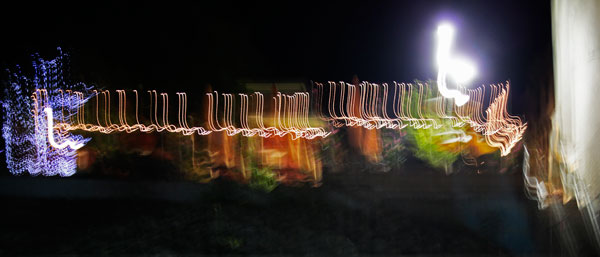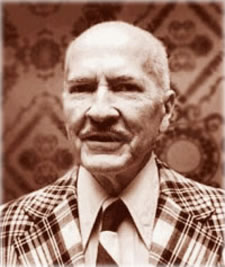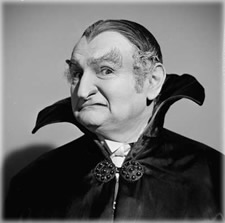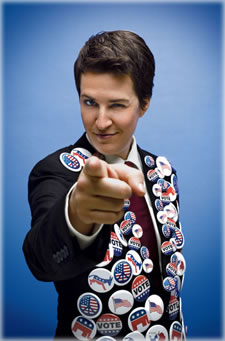
Planetary Cycles. Photo of Community Gourmet, next to Blue Studio, by Eric Francis.
Interview with Eric Francis by Savas Abadsidis. Eric Francis is a writer and astrologer who has contributed to the Internet since the mid-1990s — for his profession, since the beginning. He came to astrology from environmental investigative reporting, so he has a background in technology, exposing fraud and how invisible things can affect the whole world. He answered these questions in late March 2010 while in Portland, Maine.
How does the virtual world relate to the world that you function in as an astrologer? Are there analogies?
First, a bit about that function: I’m one of the people who writes the horoscopes that appear in the backs of magazines and on the Internet. I also work with individual clients, conduct research and train other astrologers in counseling techniques. I do a lot of news analysis as well, using the positions of the planets at the time of major public developments.

Capacitor cut from my telephone network interface by friendly Verizon guy, which was slowing down my DSL connection. Photo by Eric.
I have a very old kind of job but I think that the emergence of the virtual world has some deep connections to what I do, and to what many astrologers do. Often astrology seems like a model of the Internet — but an ancient model, created long before it was a twinkle in the eye of a gamer, hacker or academic. Astrology functions as a shared field of connection; and as a system of symbolic representation; and as a language.
I often think of astrology as a metaprogramming tool. It’s a way to describe extremely complicated concepts in short notation, and then to express those concepts in a useful way. But you have to know what you’re doing for it to work effectively; that is, in a way that fosters growth, awareness and potential.
By metaprogramming tool, I mean it’s a way to look at and also to assemble the core concepts of how we think of ourselves, and explore their relationships. I’ll give you an easy example. Venus and Mars are active in the charts of all men and all women. In astrology you’re not strictly “a man” or “”a woman” and stuck to those roles. The moment you open a person’s chart, you see how their male side functions and how their female side functions, and how the two relate — and being aware of this shift in model can change your life in a matter of moments.
It’s also possible to use astrology in a way that reduces people to their symbols, and limits their potential. That’s reductionist. But that’s more about the use than astrology itself. With astrology, as with many things — such as the Internet — you tend to get results based on the creativity and intention you put in. The use of symbols can move a lot of creative energy, if you focus your awareness and intention.
A lot of people don’t believe in astrology. What do you say to them?
Astrology is a tool like any other. It works, but I think it needs to be mixed with plenty of real-world knowledge and experience in order to have ethical grounding and actual use. Here’s an example: You can be a database programmer and be very good at programming, but unless you know how people tend to think and work, your databases aren’t going to be convenient to use. You need to know almost as much about people as you do about computers. If you follow the basic lines of human thought habit, you can create intuitive programs that ease our lives mentally, and help people unfold their potential.

Stan faces down his Facebook profile, after getting "sucked in," from South Park Episode 1404: "You have 0 Friends."
Astrologers need to work in the same spirit. We need to remember that people are quirky, that we’re all unique, and most of all, that symbols stand for something else. The thing that distinguishes astrological symbols from many of the symbols that we typically encounter (say, for example, in commerce) is that they’re so well used by so many people that they are archetypes. Carl Jung gave us this term. Archetypes are a special kind of living symbol which moves down the ages and which exists in some form in every culture.
Many or even all of them are already in your mind when you’re born. Imagine if the characters on South Park had been around for 3,000 years, and revered by many of your ancestors and billions of people down the ages, collecting momentum in the genetic memory — that’s what astrological symbols are like. They have residence as living psychic entities in our minds and bodies; they have gravity and cycles. That’s why the concepts associated with them have such validity on the human level. They’re not external to us; they’re part of us.
The virtual world to some extent demonstrates that there is existence beyond the body, as does astrology — we’re overcoming this belief that everything is strictly limited by physical reality. To get into virtuality we need these interconnective devices. So far there are no psychics I know of who can get onto the Net with their minds, but the time may be coming. Without the need to use any equipment at all, astrology can demonstrate that we’re all part of the same reality, and that communication extends beyond the body and the known senses. We try to emulate this with all of our technology. That emulation, much like astrology, can point us toward the reality, or it can keep us trapped in a little model of reality.
From the perspective of the work you do as an astrologer, how do you think what many young people experience in their virtual (online) lives via avatars or role-playing games (RPGs) affects who they think they are?

Both astrology and avatars involve the use of symbols. With both kinds of symbols, we attempt to tell a version of the story of our lives. Sometimes we succeed. Often we don't. Good astrologers will remind you that the map is not the terrain. A person's mind is more complex than their chart. A person with an avatar is not their avatar. But it's clear that you can use your avatar creatively; that you can create a kind of extremely rich parallel world to your own. At professional astrology conferences, a good few people chirp about their Pisces Moon and Aquarius rising and Venus in Leo, as if that reveals anything about who they actually are. In this mode, astrology is being used as a metalanguage, but it's also reductionist. There's no way to make sure that we all agree what Venus in Leo means, and it does mean something different to everyone. In this way, it shrinks our potential, and limits the potential of astrology as a means of exploring who we are. Animating one's avatar can be a way of breathing life into existence, via proxy. We do a lot of that these days; we create nicknames and handles and profiles and listings and live through them vicariously. We have different email addresses and Facebook pages for different purposes. I suggest we see this for what it is, the creation of alter egos.
We can bring creativity to this process. Or it can be used to give us a false sense of control, and an attempt to simplify existence in a time when life is exceptionally complicated.
Looked at another way, this says something about the dangerously disembodied state of the Internet. We have to be mindful of these attempts to escape ourselves and live in fantasy rather than taking actual creative risks, daring to encounter others in vulnerable situations.
This can have a psychological advantage, such as tricking yourself out of your current ego reality so you can experiment with other ideas and possibilities. For example, if you’re a shy person, you can pretend to be an outgoing person. If you’re homophobic you can pretend to be gay. If you’re a prude you can pretend to be saucy. But why pretend? Well, there’s no risk in pretending; but there’s not so much reward, either.
Do you think this strengthens human relations, or as some like Jaron Lanier have suggested, “The most popular aspects of Internet life — including Wikipedia, Facebook and digital music — are so detrimental to humanity that they give young people a reduced expectation of what a person can be”?
Human relations are based on direct experiences. A role-playing game is not direct experience; it’s role-playing: it’s a game. An actor acting a part in a play is not that character. A football team representing a city is not that city. I think we’re in serious trouble when we blur the line between our ‘avatar’ and the reality of who we are. It’s the real person who has the relationship, and who grows, not the avatar.

Photo by Eric Francis.
We tend to trust people because they prove themselves trustworthy when we’re vulnerable. We tend to love the people we nurture, and I don’t see a lot of room for actual vulnerability or nourishment in most online experiences, particularly if they’re lived by proxy — by any form of false name or assumed identity, which is an attempt to evade vulnerability. But there are ways to get there, ways to express vulnerability in the virtual world, but they can be extremely slippery. We all know this.
I agree with Lanier’s basic idea, but not with all of his examples. I’m a professional editor, and I participate in Wikipedia as a volunteer editor. To me Wikipedia seems like a process of documentation and consensus building similar to many other time-honored academic and editorial projects. Editors work in a dynamic environment. There’s grounding, in a process of reason; the rules say you have to footnote and anyone can be held to them. Human dynamics come into play constantly, and there’s a work output that’s useful to many. The result is an authentic document of our times, created cooperatively.
Wikipedia can be dangerous if you think it’s the only source of knowledge. If you don’t know how to use it as a reference, it can be a kind of reduction of reality, but so is any one form of literature. To get around that, click on the footnotes and see where they lead. Read the discussion page and see what the editors are saying about an issue. You will learn a lot. Wikipedia leaves open many doors to the ‘real world’. I think it’s one of the most revolutionary things on the Internet.
As for music — just about all music is recorded and distributed digitally, unless you’re at the concert or the drum circle. Yes, there’s fidelity loss, and many people use digital audio editing in a way that would prevent them from ever performing the thing you heard recorded (that’s nothing new — the best recording studios, such as Bearsville, were doing that 20 years ago). But there’s an exponential gain of accessibility. Any artist can get his or her music to an audience with a website. You no longer need a record contract to have others from far away appreciate your work, or buy it. You no longer need a studio to make a basic, decent recording.
What always matters with any form of art is the talent and love one invests into the work. Practice still makes you a better musician, and ultimately, one’s underlying talent and devotion and sense of existence are what come through (or not) no matter how we record or distribute our work.
I think that Facebook is a logical outcome of the Internet in its current form. Many people who don’t have much to say finally have someplace to say it. It’s exciting on one level because we get to post our thoughts into a public forum. For people who in the past have just read the Internet and have never contributed, this is something novel. Yet the way it’s done it’s usually an obvious indulgence in self-obsession, and that is only so interesting. It’s only so relevant. We try to reduce ourselves to clever sound bites and tales of making dinner. It’s a form of 15-second fame. All we get are fragments of who a person is, and our hearts and souls yearn for cohesion, for authentic narrative. You could write a very interesting story about making dinner, but I think you would need more space.
Sure, Facebook strengthens some relationships. Somewhere in the world, high school sweethearts are finding one another for the first time in 30 years. Many other people are collecting thousands of “friends” they will never meet, talk to or care about. It’s all how you use it.
Do you think social networking as a further extension of the Internet has brought us closer or farther apart?
All that matters is the potential. All the ways we’re currently using social networking to isolate ourselves, we can leave behind. All its potential as an awareness tool we can embrace this moment. I will say this, if we think that social networking is actually a form of companionship, that’s going to make our emotional lives difficult. We need one another, for real, and in person — not just on a buddy list.
Why is it that science fiction writers like Ursula K. Le Guin (The Left Hand of Darkness) or Robert Heinlein (Stranger in a Strange Land) were able to use the genre to push the boundaries of sexuality, while the video game makers give us Grand Theft Auto? Is that in its own way pushing the boundaries, or just promoting violence?

Robert A. Heinlein (1907-1988), American novelist and science fiction writer, one of the inventors of modern polyamory.
Novelists write books because they have ideas and characters and stories burning in their minds. The writers you mention were fortunate enough to reach wide audiences and they affect peoples’ lives to this day. The boundaries they were pushing were evolutionary, and had nothing to do with a profit motive. To the contrary — we write because we have something to say, and we take a risk saying it.
Le Guin was one of the writers who introduced us to the idea that gender is optional; we can choose our gender from moment to moment. Heinlein introduced us to the idea that we can love and be loved by as many people as we want, and that we’re only limited by our beliefs about ourselves. These ideas have helped many people evolve their lives, and sparked many other thinkers into action. For example, Heinlein helped launch the polyamory movement, which is a worldwide trend toward people having open, honest, nonmonogamous relationships — and just about every polyamorous person understands who Heinlein is.
In their day, these books were as accessible to peoples’ minds as video games are today — and that is incredible.
I wasn’t there when Grand Theft Auto was created, but the name tells you a lot. Okay, you get to pretend you’re a criminal roaming the streets of a city. And then?
Why is this generation so obsessed with vampires and zombies? And from where do the roots of this stem?
Let’s take these symbols one at a time. Both deal with the state of being undead. Undead is the opposite of alive, but not really dead. I think they reflect how many people are terrified that this is how we’re living our lives.

Al Lewis as Grandpa Munster.
Vampires flirt with the most seductive human experiences, yet for the most part they’re celibate. They represent powerful forces operating under the psyche and yet it cannot fulfill our real human need for contact. The vampire metaphor is that the mortal gives up his or her life force to the immortal; it’s an act of total submission. This description reminds me of immortal corporations vamping off of submissive, mortal humans. In many, many ways we are confronted with this kind of energy theft at this time in history.
In vampires we also have the image of compulsion, of doing what we need to do because we have no way to avoid it. In an era when we are met with so much seduction, and so much compulsive behavior, and so many addictive substances, and when we have so many opportunities to withhold or be withheld from, I think vampire stories give us a way to process our responses.
Zombies are another story. I think they’re a reflection of our fear that we’re going unconscious; that we are living the lives of the undead; of the totally unconscious, who can neither wake up or die properly. To me they’re our symbol of humans living automatically, or as slaves of our technology. And hey, if we do it because everyone’s doing it, that allegedly absolves us of any responsibility for our own lives.
Where in pop culture do you think the boundaries are being pushed?
I’m not sure it’s ever been the job of pop culture to push boundaries, but sometimes it happens. We live in a time when it’s difficult to push boundaries because we either don’t know where they are, or because we’re so caught up in our own heads that the least movement into physical experience is pushing boundaries. Anything we do that involves going beyond a fear is pushing a boundary. Laughter is a psychological sign that we’re abandoning fear; that we feel safe. Comedians help provide that safe environment and we are in a golden age of comedy and satire right now.

Rachel Maddow.
I’m a big fan of The Onion because they have no sacred cows, and at the same time they’re like a divining oracle of the insanity of our moment. It’s one of the few places you can read something that’s absolutely honest and not dictated by what people might think. You can laugh at yourself. Their three-minute newscast videos are just beyond brilliant. Yet they can push boundaries because they have them: the writing is impeccable, they’re funny nearly all the time, and most of all, they’re relevant.
Rachel Maddow on MSNBC is pushing a boundary of proving that television can be honest and intelligent. If you’ve seen her you know she’s funny and that she doesn’t take herself too seriously. The intelligent part is crucial in a world where the main boundary we run into is how stupid people are presumed to be, or rather, presume themselves to be — the “I’m a zombie” factor. She entices her viewers to take on challenging issues, and is basically living proof that it’s cool to be intelligent; not a geek, but sensitive to the many dimensions of an issue. She pushes other broadcasters to be real and to take chances. And she’s a dearly needed example of a woman in her power, who stands on the strength of her own voice and her own ideas. I don’t think you’ll ever see her pimping the Palm Pre.
There’s some great stuff going on at Comedy Central; almost enough has been said about Colbert and Stewart, but as a journalist I will say that I look to these guys as some of the most effective news analysts out there. Danny Tosh is one of the unsung geniuses on Comedy Central at the moment. Tosh.o is a program about how absurd the Internet is, or rather, how absurd people are and what you can find of that madness on the Internet. He’s willing to let people be as mindless as they are; he’s like a dream muse for the online world.
Most of where boundaries are being pushed, you don’t hear about yet. The culture either isn’t open enough, or where it’s open it’s a special challenge to get traction. I think with pushing boundaries, we need to not be pushed but rather guide ourselves to be more daring, to take chances, and to use technology as what it is: a raft to another shore.

